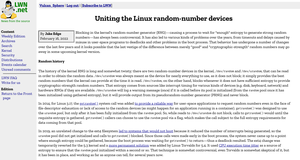 | |
 A screenshot of LWN.net | |
Type of site | Online newspaper |
|---|---|
| Available in | English |
| Created by | Jonathan Corbet and Elizabeth Coolbaugh |
| Revenue | Subscription, Advertisement |
| URL | lwn |
| IPv6 support | Yes |
| Registration | Optional |
| Users | Over 100,000[ when? ] |
| Launched | January 29, 1998 [1] |
| Current status | Online |
| Written in | Python [2] |
LWN.net is a computing webzine with an emphasis on free software and software for Linux and other Unix-like operating systems. It consists of a weekly issue, separate stories which are published most days, and threaded discussion attached to every story. Most news published daily are short summaries of articles published elsewhere, and are free to all viewers. Original articles are usually published weekly on Thursdays and are available only to subscribers for two weeks, after which they become free as well. LWN.net is part of Eklektix, Inc.
Contents
LWN caters to a more technical audience than other Linux/free software publications. It is often praised for its in-depth coverage of Linux kernel internals and Linux kernel mailing list (LKML) discussions. [3] [4] [5]
The acronym "LWN" originally stood for Linux Weekly News; that name is no longer used because the site no longer covers exclusively Linux-related topics, and it has daily as well as weekly content. [6]
